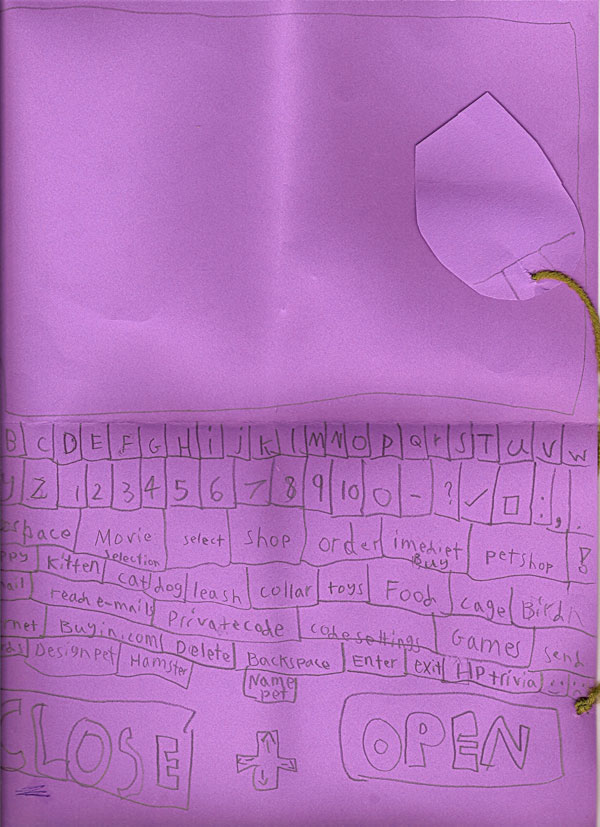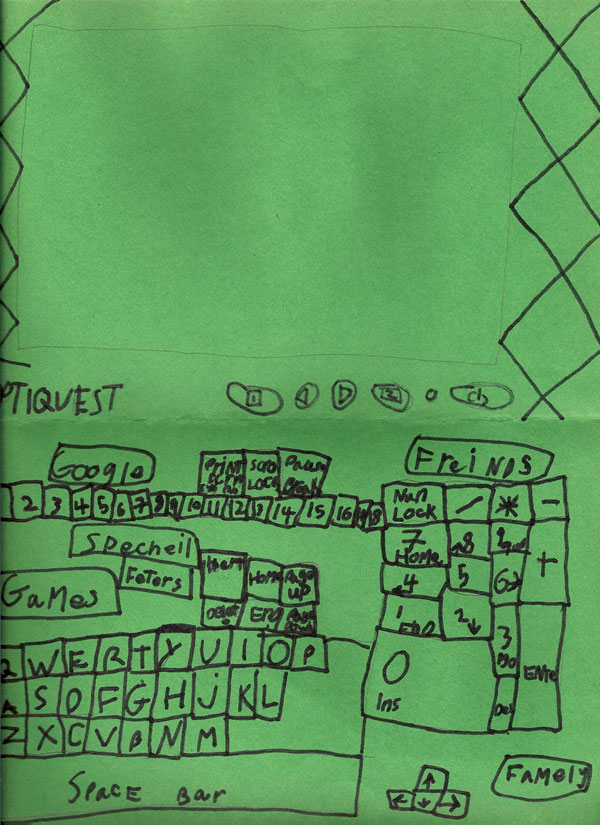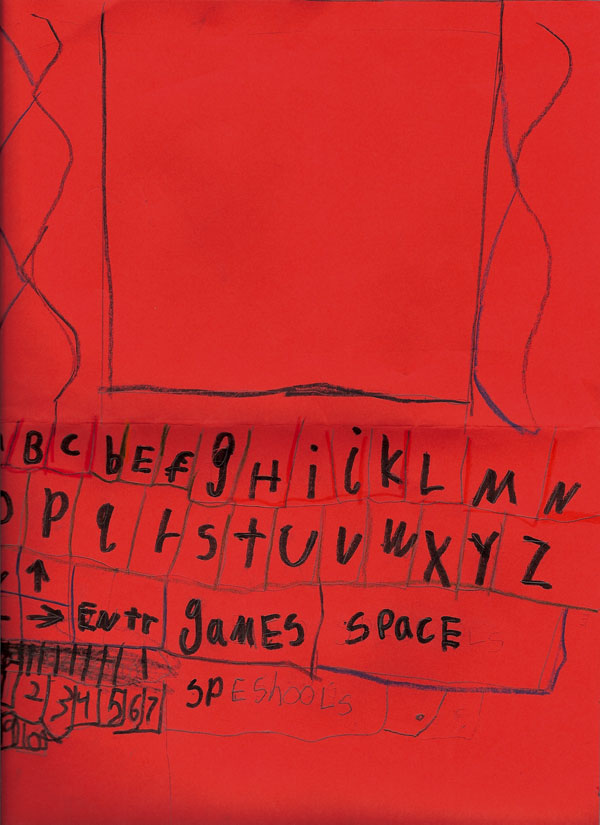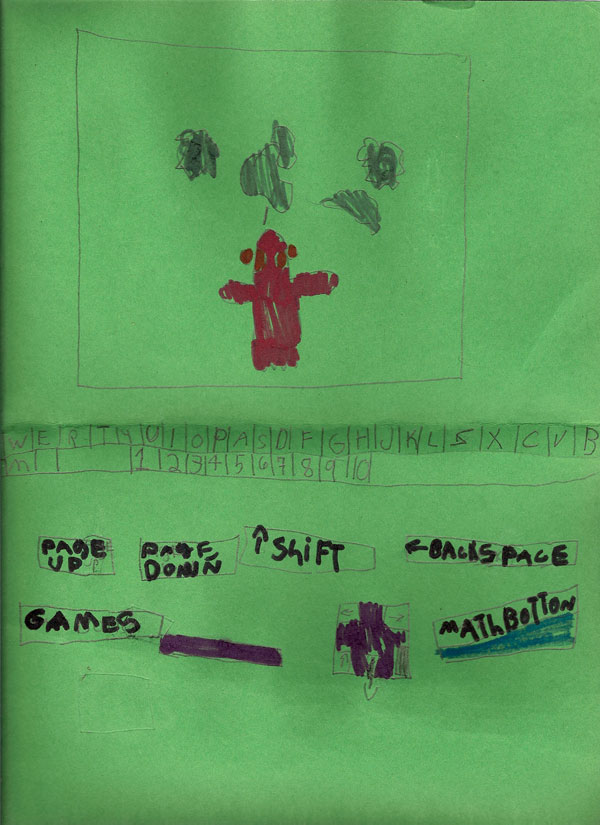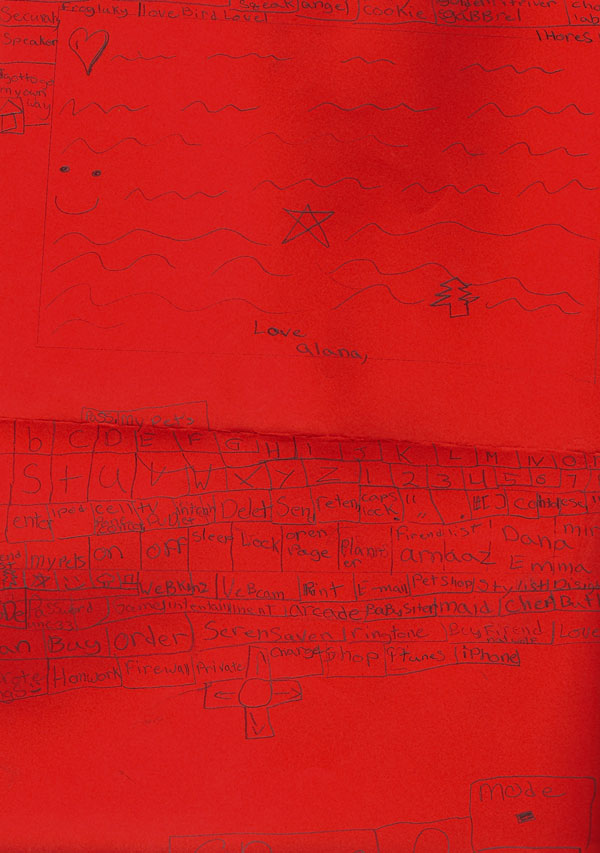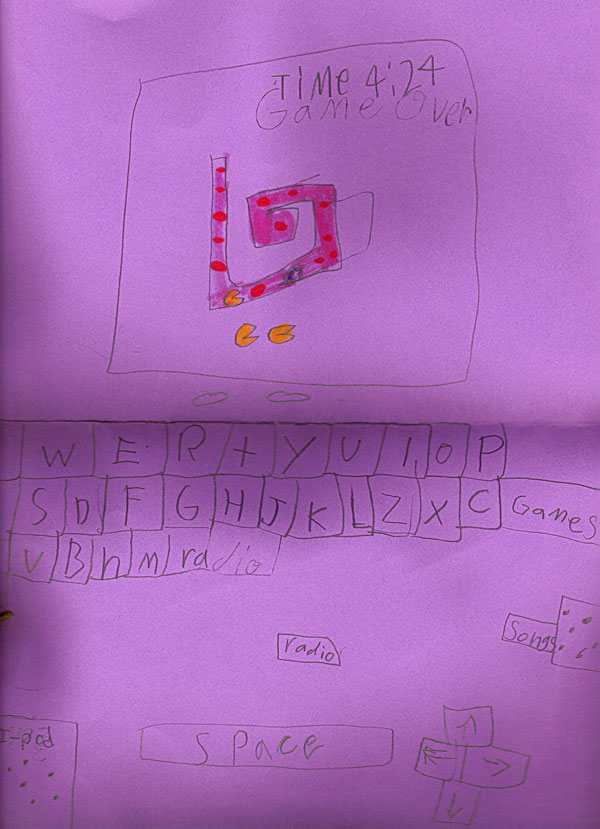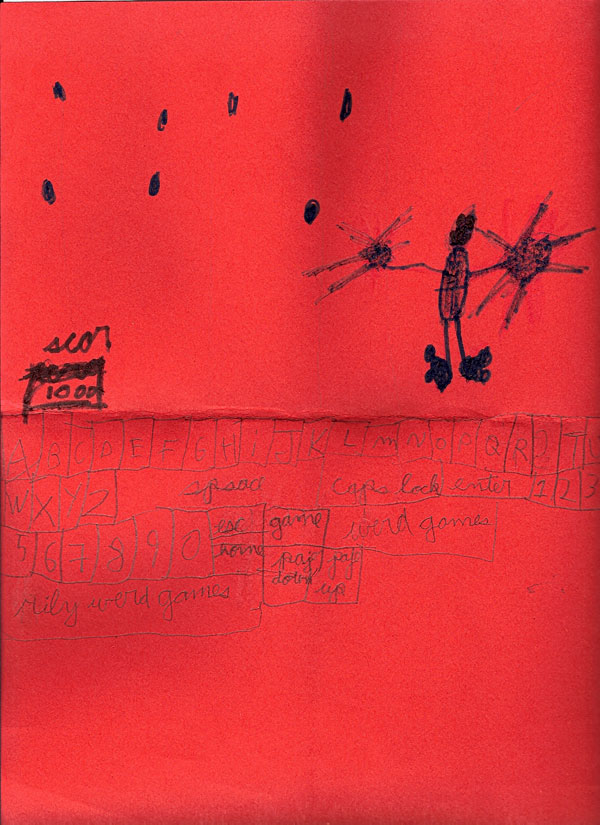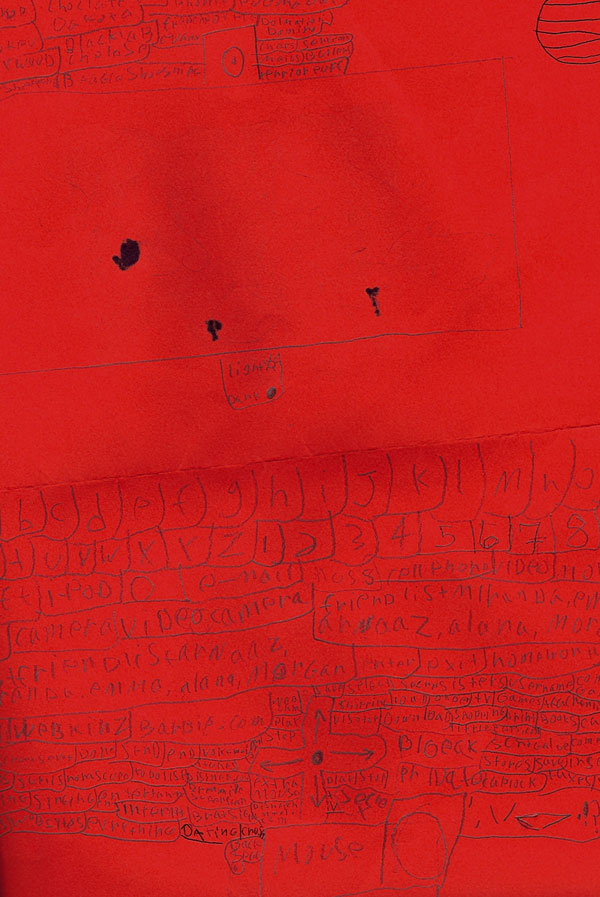When I saw Amy Tiemann’s blog post on CNET two months ago about a children’s “laptop club,” I asked her to send me some samples. Many permission slips later, a package arrived in the mail bursting with construction paper—a wonderfully crafty collection of laptops designed by seven- to nine-year-olds in North Carolina that are both heartwarmingly personal and frighteningly tied to pop culture. A close study reveals keyboard buttons assigned to “Barbie.com,” “best friends” next to “friends,” “HP [Harry Potter] trivia,” and “werd games” as well as “rily werd games.” I asked Tiemann to explain a little bit about the program, where it came from and what it says about how children (girls in particular) think about computers these days. There are also interviews excerpted below that I conducted with some of the laptops’ designers.
Tiemann writes (parent.thesis), the parenting and technology blog for CNET.com, and explores Gen X and Y’s reactions to motherhood on her own web site, mojomom.com. She is the author of two books, Mojo Mom: Nurturing Your Self While Raising a Family, and the young adult novel High Water. Before she was a writer, she was a research neuroscientist, receiving her Ph. D. from Stanford, and taught high school science in San Francisco. She now makes her home in Chapel Hill, NC.
All images appear courtesy of the artists in The Laptop Club, all rights reserved.
First, how did you hear about “the laptop club”? What is the story behind the project?
I write about parenting and technology for the tech news site CNET, so I am always on the lookout for original examples of kids interacting with computers. I knew the kids in this local after-school program and when I saw one of their laptops, I asked to see more. At this Montessori school they don’t use computers in their daily curriculum, but the kids do get exposed to them a little bit in the after-school program, and elsewhere.
How old in general are the children involved? How did the project come about?
The children started making these laptops last year and dubbed themselves “the laptop club.” This was truly an innovation of kid culture without adult coaching. The children were in second and third grade last year, and are continuing to create and play with new designs this year. They are seven to nine years old. Several boys participated last year, but the laptops submitted for this gallery all happened to be created by girls.
Two of the club’s “founders” were boys, but all of the kids played with their laptops so much that many of the laptops have been worn out or lost. Those two boys just so happen to not be in the after-school program this year, or they would probably still be making laptops.
A lot of the children’s keyboards have buttons dedicated to different ways to shop, or to pop-culture icons. Where is this coming from?
I used to suspect that the idea of Tween Culture was an urban myth created by marketers, but now I believe that wherever it’s coming from, it is a real phenomenon. Eight years old appears to be a watershed year for many girls in which they begin to participate in pop culture and also crystallize their social structure. Knowing who your friends are, and either committing to a best friend or figuring out how to remain friends with everyone, are very important. That’s what fascinated me about their laptops. It was a way to demonstrate their knowledge of pop culture and social networks. Having your name on your friend’s keyboard is a little like being in someone’s “Top 8 friends” on MySpace. And yet these kids most likely don’t even know about MySpace yet.
Name: Mandy
Age: 8
How often do you use a computer? Five times a week.
What do you like to do when you’re using a computer? Play games and write stories and poems.
What will computers look like in the future? Well you see, if we had whole days to work on it, and bigger paper, I think we could make it way more detailed.
Who is better at using a computer, you or your parents? Games + me = good. Parents + trying = bad. I am better at using games and if you guys try them, you get crushed.
[ After being told this interview would be published on the internet ] “I’m going to be popular! I should make a blog button, right now.”
It is clear that the digital world is already huge for elementary-age kids, whether it is Webkinz, Littlest Pet Shop keychain pets, Club Penguin, or Nickelodeon TV show web sites. I am trying to keep my 8-year old daughter off the internet for as long as possible but it’s hard to resist the social pressure. She has been begging for a Webkinz for six months now. She has even said that she doesn’t care if we don’t let her go online with her Webkinz, she just wants to be able to say that she has one. But of course if she did have one, she would want to go online.
Many of the keyboards, though, have buttons for the kids’ friends, family, and pets. How do you think they see computers fitting in their lives?
Kids are intensely social creatures and you can really see what is important to them by looking at their designs. I love all the keys dedicated to pets. Where my friends and I used to have imaginary horses, now these girls have imaginary pets with an online identity.
The inevitability of it all drew me to the paper laptops. Parents may want to delay their children’s computer use, but here they are drawing their own designs. It reminded me of taking away toy guns and seeing the kids make guns out of sticks instead.
Laptops in the classroom are now considered essential in many states’ education systems, down to very young ages. Are they replacing pencils, encyclopedias, physical playtime?
At this particular school they don’t generally use computers in the classroom. I have seen computers in other schools used as rewards for good behavior. When it comes to research, I’ll be the first to say that online resources beats an encyclopedia any day. As a journalist and nonfiction book writer I do not miss card catalogs and microfilm one bit.
Name: Dana
Age: 8
How often do you use a computer? A couple of times a week.
What do you like to do when you’re using a computer? Go onto webkinz.com or disneychannel.com and play games.
What will computers look like in the future? Like TVs.
Who is better at using a computer, you or your parents? My parents.
But for kids, I still push back against the idea that computers are a necessary learning tool. I say this as a former neuroscientist (i.e., “Baby Einstein” and the like are bunk), and my husband Michael rails against intensive early computer use as a programmer who was ultimately sidelined by repetitive stress injury.
What I love is how personal these laptop designs are. My Macbook seems very stodgy next to them. Are any of the laptops going into production soon?
Some days I wish my Mac had a key for Harry Potter trivia! At our house we’re going to experiment with the One Laptop Per Child machine (through the Get One Give One program) and see what that is like. It’s hard to be a wired parent who is trying to keep her kid in the real world for as long as possible. As much as I love computer technology, write about it, and use it myself, I don’t have any precedent to refer to figure out the right time to introduce kids to it.
It is really interesting to write for CNET because it finally dawned on me that a mother’s viewpoint is by nature diametrically opposed to the viewpoint of most CNET readers. Not that I am a cranky old luddite, either! But even though I am in my thirties, love gadgets, and work online all the time, being a protective and skeptical mother is very different than being a young, single, male, libertarian hacker. So I didn’t realize I was signing on to write a contrarian point of view, but that is how I often come across to your typical CNET reader.
The mini-laptop club project shows me just how far the concepts behind the virtual world have penetrated into real life. Even with relatively little exposure to computers, these children have absorbed ideas about shopping online, interacting socially with virtual pets and real friends, and even media convergence with their favorite movies and songs loaded on the laptops. They get these ideas from siblings, friends, TV shows and ads, and watching their parents use computers.
